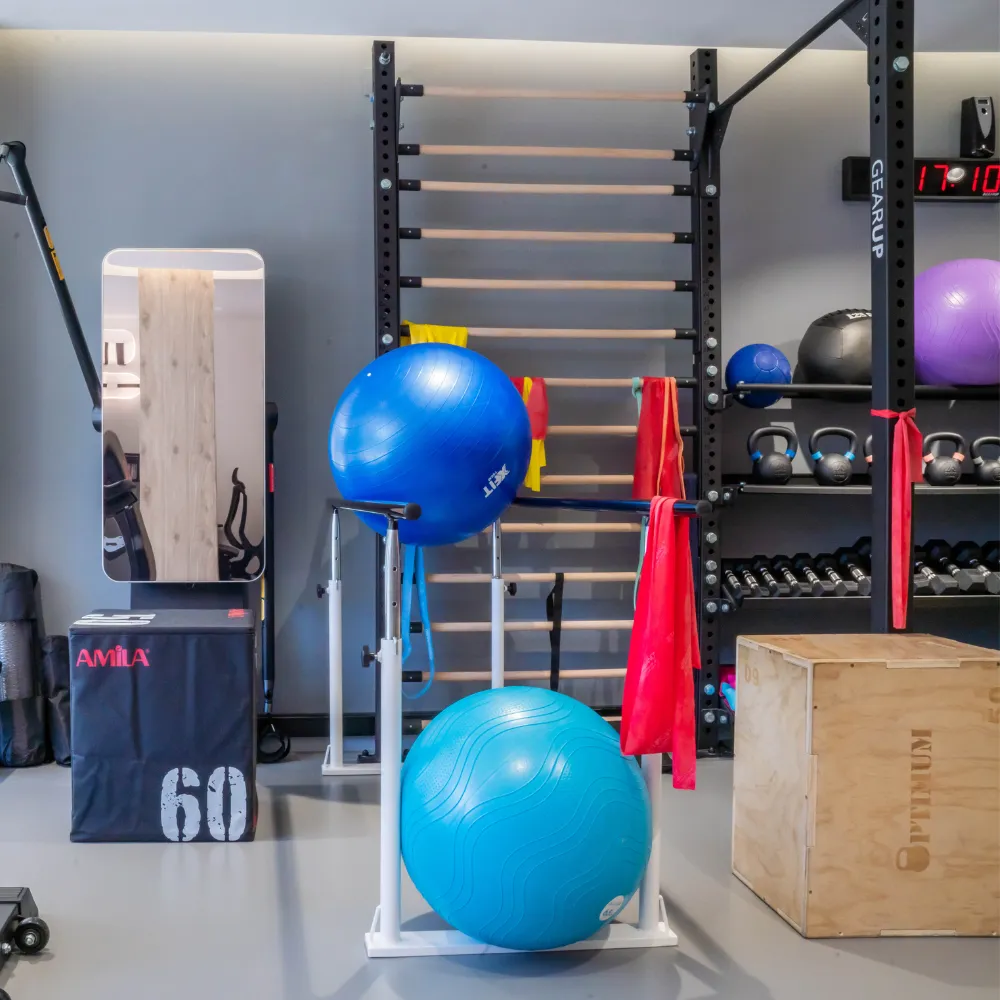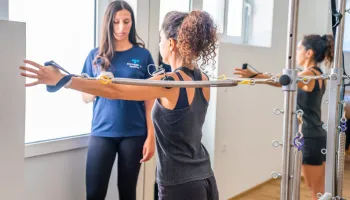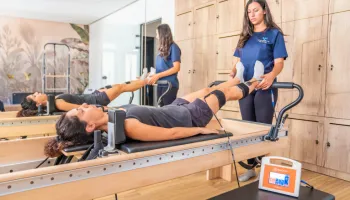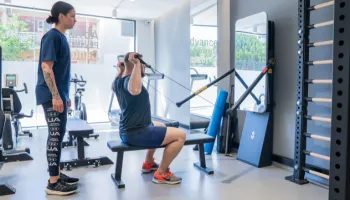Therapeutic Exercise
What is therapeutic exercise?
Therapeutic exercise is often the last stage of physiotherapy and serves as a means of maintaining results and strengthening the muscles. It is the planning and implementation of a complete and personalised training plan, aimed at improving movement and the return to a functional everyday routine , usually after surgery or an injury.
At PHYSIO4U exercise is an integral part of a successful physiotherapy session. That’s why we have created a modern, fully equipped area for targeted kinesiotherapy, exclusively dedicated to therapeutic exercise services.
The types of therapeutic vary depending on the case, needs, potential and possible injuries of the athlete - patient. Therefore, the training programme may consist of aerobics, workout with weights, resistance with elastic bands, stretching and flexibility exercises and, of course, a combination of all the above. All programmes are customised to suit each individual and are consistently conducted under the supervision and guidance of specialised physiotherapists.
At PHYSIO4U exercise is an integral part of a successful physiotherapy session. That’s why we have created a modern, fully equipped area for targeted kinesiotherapy, exclusively dedicated to therapeutic exercise services.
The types of therapeutic vary depending on the case, needs, potential and possible injuries of the athlete - patient. Therefore, the training programme may consist of aerobics, workout with weights, resistance with elastic bands, stretching and flexibility exercises and, of course, a combination of all the above. All programmes are customised to suit each individual and are consistently conducted under the supervision and guidance of specialised physiotherapists.
What does therapeutic exercise entail?
Therapeutic exercise at PHYSIO4U starts with the clinical examination, which includes special assessment tests and measurements, which help us record the patient’s functionality, condition and range of movements.
Then, we proceed to determine the programme, the frequency of training sessions and their implementation. Our main concern is to avoid exercises and techniques that may further burden athletes while performing them. This requires constant cooperation and excellent communication between the physiotherapist and the patient, at every stage of the rehabilitation and adjustment of the exercise plan.
Our objective is to maintain the therapeutic outcomes attained through physiotherapy by means of repetition and ongoing monitoring, facilitating the patient-athlete's return to a pain-free normal daily life..
Then, we proceed to determine the programme, the frequency of training sessions and their implementation. Our main concern is to avoid exercises and techniques that may further burden athletes while performing them. This requires constant cooperation and excellent communication between the physiotherapist and the patient, at every stage of the rehabilitation and adjustment of the exercise plan.
Our objective is to maintain the therapeutic outcomes attained through physiotherapy by means of repetition and ongoing monitoring, facilitating the patient-athlete's return to a pain-free normal daily life..
For which cases is therapeutic exercise recommended?
A personalised therapeutic exercise programme can help alleviate symptoms associated with various significant issues.
It is mainly used in the following cases:
• Post-operative rehabilitation
• Post-injury rehabilitation of movement
• Treatment of musculoskeletal problems
• Chronic pain
• Prevention or reduction of risk factors associated with cardiovascular health
• Disability prevention
• Prevention of falls in older age
Along with addressing the patient's primary concern, therapeutic exercise yields significant additional benefits for:
• Physical condition
• Increased stamina
• Bone health
• Muscle strengthening
• Improved psychological well-being
• Enhanced well-being
• Better quality of life
It is mainly used in the following cases:
• Post-operative rehabilitation
• Post-injury rehabilitation of movement
• Treatment of musculoskeletal problems
• Chronic pain
• Prevention or reduction of risk factors associated with cardiovascular health
• Disability prevention
• Prevention of falls in older age
Along with addressing the patient's primary concern, therapeutic exercise yields significant additional benefits for:
• Physical condition
• Increased stamina
• Bone health
• Muscle strengthening
• Improved psychological well-being
• Enhanced well-being
• Better quality of life
Therapeutic exercise is different from that performed in mass exercise venues, such as gyms or Pilates studios. Patients’ pre-existing pathology requires an exercise programmethat has been thoroughly considered and properly structured by the physiotherapist, who is present throughout the session with the athlete, monitors the execution of the exercises and corrects the technique where necessary.
What you need to know regarding your first appointment
Save valuable time by coming prepared to your first appointment at the PHYSIO4U physiotherapy centre: bring everything that is necessary for us to start your case assessment right away!
Medication
Make a list of the medications you are taking and give this information to your physiotherapist during the assessment.
Recent tests
Make sure you have your most recent medical diagnosis with you, along with the results of any recent tests, such as x-rays, CT or MRI scans, etc.
Comfortable clothing
Wear comfortable clothes, especially in the area of the body that is affected or painful. This will allow the physiotherapist to better access that area and carry out the treatment most effectively. In addition, comfortable clothing will allow you to feel at ease and relaxed during the session.





